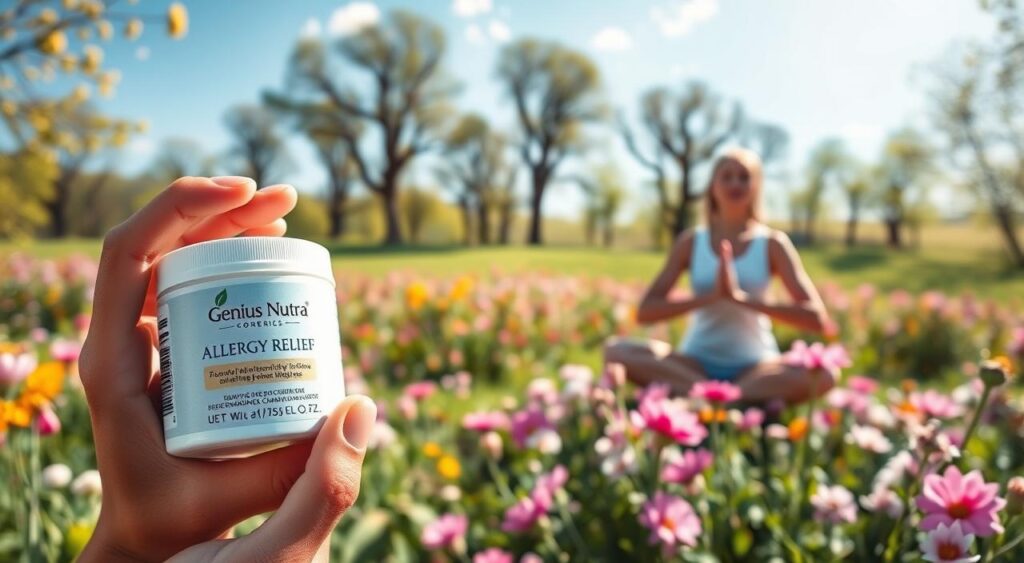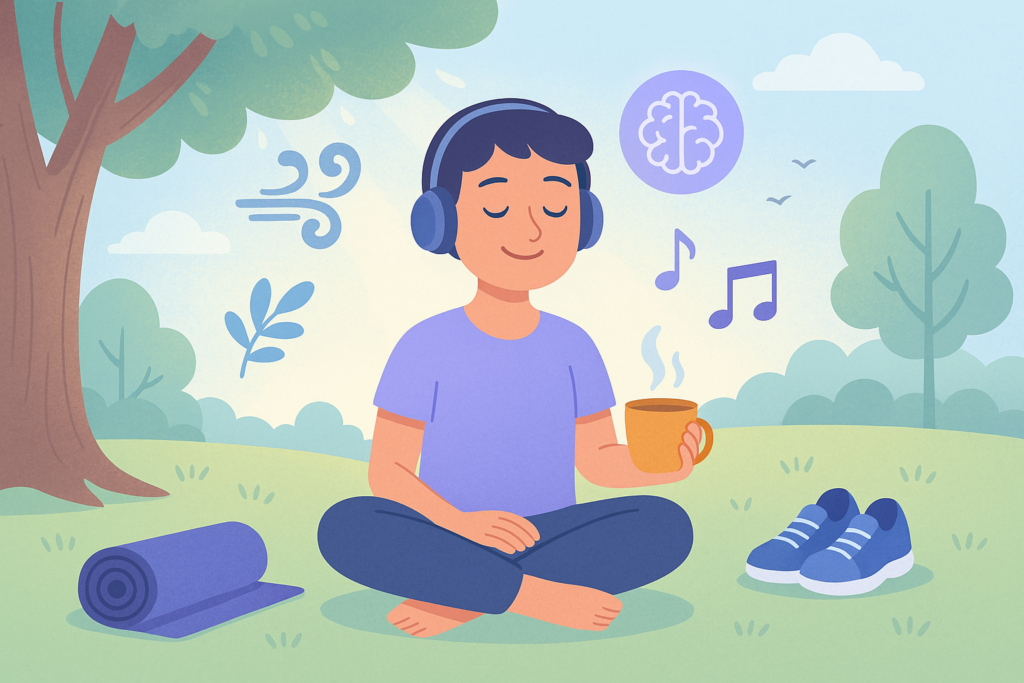Ever wondered why some people stay healthy all year while others don’t? It’s all about adapting to the seasons. Whether it’s fighting winter colds or spring allergies, the right tips can help. This article will share key wellness strategies and expert advice to keep you healthy all year.
Understanding Your Body’s Needs Through the Seasons
As the seasons change, so do your body’s needs for wellness. Mood, physical health, and energy levels can change with the seasons. It’s important to recognize these changes to use the right health strategies for each season.
The Impact of Seasonal Changes on Health
Seasonal changes can impact your mental and physical health. For example, less sunlight in winter can make you feel less energetic. Changing your routine can help keep your energy levels up.
Doing outdoor activities, even in cold weather, can improve your mood and health. This helps keep you well all year round.
Recognizing Seasonal Affective Disorder
Knowing about Seasonal Affective Disorder (SAD) is important. It’s a type of depression that happens with the seasons, often in winter. Symptoms include sadness, irritability, and feeling tired.
Using light therapy, exercise, and a healthy diet can help fight SAD. These strategies are key to keeping a healthy mind all year.
Adapting Your Diet Throughout the Year
Changing your diet with the seasons can boost your nutrition. Eating fresh, seasonal foods gives you the nutrients your body needs. In winter, eat more hearty vegetables and grains.
In summer, enjoy lots of fruits and salads. Eating this way supports your health and helps you live a vibrant life.
Essential Nutrients for Every Season
Keeping your body healthy all year is key. Each season offers special foods that boost your health. Eating seasonal foods helps you stay fit and well.
Foods to Boost Immunity in Winter
In winter, it’s important to strengthen your immune system. Oranges and grapefruits are full of vitamin C. Dark leafy greens like kale and spinach also help fight off colds.
Eating these foods keeps you healthy. It makes it easier to stay well in the cold weather.
Refreshing Summer Fruits and Vegetables
Summer is the time to stay hydrated. It’s filled with cool fruits and veggies. Try adding berries, watermelon, and cucumbers to your meals.
These foods are tasty and keep you energized. They help you stay active and healthy during the summer.
Fall’s Harvest: Nutritional Powerhouses
Fall brings a bounty of nutritious foods. Pumpkins, sweet potatoes, and apples are great choices. They’re full of fiber and vitamins.
These foods fuel your body and keep you full. Eating seasonal foods helps you adjust to the changing weather.

Staying Active in Hot Weather
High temperatures can make it hard to stay active, but it’s key for your health. Adding healthy lifestyle tips to your routine helps you stick to your fitness goals, even on the hottest days. It’s not just about outdoor activities; finding indoor ways to stay active can be fun and fit your wellness habits.
Indoor Workouts for Scorching Days
When it’s too hot outside, try indoor workouts. Many exercises can get your heart rate up without the heat. Here are some options:
- Yoga: Great for flexibility and calming your mind.
- Strength training: Use weights or resistance bands to build muscle.
- Cycling: Stationary bikes offer a great cardio workout.
- Dance classes: Fun and energetic, they can boost your mood.
These activities keep you engaged and show the value of a fitness routine.
Incorporating Water Activities into Your Routine
Water-based workouts are a cool way to exercise in the heat. Try these activities:
- Swimming: Works your whole body and is easy on your joints.
- Aqua aerobics: Fun and keeps your heart rate up while staying cool.
- Stand-up paddleboarding: A fun way to enjoy nature and stay active.
Water activities cool you down and keep you motivated to stay fit and healthy all summer.
Winter Wellness: Beating the Cold
Winter brings its own set of challenges for staying well. Cold weather can cause dehydration, a common issue this time of year. It’s important to adjust your health habits to fight the cold and stay healthy. Here are some key tips for staying healthy during the colder months.
Importance of Hydration in Winter
Staying hydrated in winter is key, even if you don’t feel as thirsty. The dry, cold air makes your body need more water. Drink lots of water, herbal teas, and broths. This simple action can boost your energy and overall health, helping you stay well.
Layering for Maximum Comfort
Staying warm outside is key to staying active in winter. Wearing layers helps keep you warm and lets you adjust as needed. Start with a moisture-wicking base layer, add a warm middle layer, and finish with a waterproof outer layer. The right clothes make outdoor activities more enjoyable and help you stay well.
Staying Active Indoors
When it’s cold outside, indoor activities are a great alternative. Try fitness classes, online workouts, or setting up a home gym. These fun activities help keep you fit, even when it’s chilly outside. Make indoor activities part of your healthy living plan to stay active all year.

For more tips on balancing health, check out this resource. It offers seasonal health advice.
Battling Allergies in Spring
Spring brings beautiful flowers and warmer weather, but it also means more allergies. You can fight your allergies with smart health tips. Knowing what causes allergies, trying natural cures, and following best practices can make spring better for you.
Identifying Common Allergens
Pollen is a big allergy trigger in spring. Trees, grasses, and flowers release pollen, leading to sneezing and itchy eyes. Mold spores and dust mites are also common allergens. Knowing these can help you manage your health better.
Tracking pollen counts can help you plan your outdoor time. This way, you can avoid the worst allergy days.
Natural Remedies to Combat Allergies
There are natural ways to ease allergy symptoms. Eating local honey can help you get used to local pollen. Saline nasal sprays can clean out your nose. Foods full of omega-3s can also boost your immune system.
Trying these natural methods is a great way to live healthier during allergy season.
Best Practices for Allergy Season
There are smart ways to handle allergies. Keep your windows shut to keep pollen out. Air purifiers with HEPA filters can also help.
Cleaning your home often, like vacuuming with a HEPA filter, can also help. These steps can help you enjoy spring without getting sick.

Mindfulness and Mental Health Year-Round
Keeping your mind healthy all year is key. You can use many strategies to keep your mind calm. Yoga and meditation help you stay mindful and balanced.
Being thankful and positive also boosts your mental health. These habits can make a big difference in how you feel.

Stress Management Techniques for Every Season
Stress changes with the seasons, but managing it is always important. Here are some tips for your wellness routines:
- Winter: Try indoor yoga to lift your mood during the cold months.
- Spring: Take walks in parks as nature awakens. It can really help reduce stress.
- Summer: Get outside with activities like swimming or hiking. They’re great for your mood and social life.
- Fall: Use mindfulness, like deep breathing, to stay calm during the change of seasons.
Practicing Gratitude and Positivity
Thinking about the good things in your life can make you happier. Try keeping a gratitude journal. It helps you stay positive and supports your mental health.
Creating a Seasonal Self-Care Routine
Creating a self-care plan that changes with the seasons can really help your mental health. Here’s a table with ideas for each season:
| Season | Self-Care Activities |
|---|---|
| Winter | Cozy up with warm beverages and read a book. |
| Spring | Start a small garden or indoor plants for relaxation. |
| Summer | Plan outdoor picnics with friends and family. |
| Fall | Prepare comforting meals and enjoy seasonal crafts. |
Adapting Exercise Routines for Each Season
Changing your exercise routines with the seasons helps you stay active. It also lets you try new things and keeps you interested. You can enjoy the outdoors in each season while staying healthy.
Outdoor Activities in Spring and Fall
Spring and fall are great for outdoor fun. Try hiking, biking, or running when the weather is nice. These activities boost your fitness and help you stay healthy. Joining community events or groups can also motivate you.
Winter Sports to Embrace the Cold
Winter offers fun and challenging exercises. Skiing or snowboarding are great for staying fit. Make sure to wear the right clothes to stay warm and move freely.
Summer Fitness Festivals and Events
Summer brings many fitness events to keep you active. Look for outdoor workouts, races, or yoga in the park. These events are a great way to meet people and enjoy the weather. Always drink water and find shade to stay cool.
For more seasonal tips, check out this guide on seasonal health practices. Adjusting your lifestyle to the weather is key to managing your health all year.
Building a Balanced Sleep Routine
Creating a balanced sleep routine is key to staying well all year. Sleep habits change with the seasons, thanks to daylight and temperature shifts. Adjusting your sleep schedule can boost your health. Using good health tips can make your sleep better.
Aligning Sleep Patterns with Seasonal Changes
Seasonal changes affect our natural body rhythms. Longer summer days might keep you up later. Darker winter nights might make you go to bed earlier. Adapting your sleep to these changes helps your body stay in sync.
Tips for Better Sleep Hygiene
Good sleep hygiene leads to better nights. Here are some tips for a healthy bedtime routine:
- Avoid screens at least an hour before bed to reduce blue light exposure.
- Create a calming environment with dim lights and comfortable bedding.
- Establish a consistent sleep schedule by going to bed and waking up at the same time every day.
These tips can improve your sleep quality, leading to better health.
The Importance of Natural Light Exposure
Daytime natural light exposure is vital for sleep. Sunlight helps set your body’s internal clock. Spend time outside, mainly in the morning, to support your health.
Staying Hydrated: Year-Long Strategies
Keeping healthy means focusing on staying hydrated all year. Drinking enough water boosts your energy, brain function, and health. Drinking water daily is a key part of a healthy lifestyle. It’s important to adjust your hydration plan with the seasons and your activities.
Benefits of Proper Hydration in Each Season
Every season has its own hydration benefits. In winter, water fights dry air and keeps your skin healthy. Summer heat makes it key for body temperature control and energy. Spring helps flush out allergens with enough water. Fall’s cooler air means hydration is vital for your immune system.
Creative Ways to Drink More Water
Make drinking water fun to drink more. Here are some ideas:
- Add fresh fruits like lemon, berries, or cucumber slices to your water for a refreshing flavor.
- Try herbal teas, specially in colder months, to stay warm and hydrated.
- Eat hydrating foods like watermelon, oranges, and leafy greens.
- Carry a reusable water bottle as a reminder to drink all day.
Adding these habits to your day can help you stay healthy. For more hydration tips, check out this link.
Monitoring Hydration in Humid Weather
Humid weather means more sweat and dehydration risk. Listen to your body’s signs. Dry mouth and thirst mean you need more water. Stay hydrated during outdoor activities in hot weather. Wear loose clothes and take shade breaks to help your body stay hydrated.
Setting Long-Term Health Goals
As you move through different seasons, setting long-term health goals is key. These goals should match your lifestyle for lasting wellness. A good health plan ties your diet, exercise, and self-care to the seasons.
This approach boosts your physical and mental health. It makes you feel better overall.
Keeping track of your progress is important. Use apps or journals to see how far you’ve come. Regular check-ins and setting achievable goals help you stay on track.
Consistency is the secret to reaching your goals. It helps you turn dreams into reality.
When you hit health milestones, celebrate them. Every success, big or small, motivates you to keep going. By making healthy habits a part of your life, you prepare for a healthier future.




Pingback: Cold Exposure for Metabolism: Safe Ways to Try It